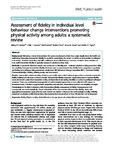Assessment of fidelity in individual level behaviour change interventions promoting physical activity among adults: a systematic review
| dc.contributor.author | Lambert, JD | |
| dc.contributor.author | Greaves, CJ | |
| dc.contributor.author | Farrand, P | |
| dc.contributor.author | Cross, R | |
| dc.contributor.author | Haase, AM | |
| dc.contributor.author | Taylor, Adrian | |
| dc.date.accessioned | 2018-01-16T15:39:01Z | |
| dc.date.available | 2018-01-16T15:39:01Z | |
| dc.date.issued | 2017-12 | |
| dc.identifier.issn | 1471-2458 | |
| dc.identifier.issn | 1471-2458 | |
| dc.identifier.other | 765 | |
| dc.identifier.uri | http://hdl.handle.net/10026.1/10594 | |
| dc.description.abstract |
BACKGROUND: Behaviour change interventions that promote physical activity have major implications for health and well-being. Measuring intervention fidelity is crucial in determining the extent to which an intervention is delivered as intended, therefore increasing scientific confidence about effectiveness. However, we lack a clear overview of how well intervention fidelity is typically assessed in physical activity trials. METHODS: A systematic literature search was conducted to identify peer - reviewed physical activity promotion trials that explicitly measured intervention fidelity. Methods used to assess intervention fidelity were categorised, narratively synthesised and critiqued using assessment criteria from NIH Behaviour Change Consortium (BCC) Treatment Fidelity Framework (design, training, delivery, receipt and enactment). RESULTS: Twenty eight articles reporting of twenty one studies used a wide variety of approaches to measure intervention fidelity. Delivery was the most common domain of intervention fidelity measured. Approaches used to measure fidelity across all domains varied from researcher coding of observational data (using checklists or scales) to participant self-report measures. There was considerable heterogeneity of methodological approaches to data collection with respect to instruments used, attention to psychometric properties, rater-selection, observational method and sampling strategies. CONCLUSIONS: In the field of physical activity interventions, fidelity measurement is highly heterogeneous both conceptually and methodologically. Clearer articulation of the core domains of intervention fidelity, along with appropriate measurement approaches for each domain are needed to improve the methodological quality of fidelity assessment in physical activity interventions. Recommendations are provided on how this situation can be improved. | |
| dc.format.extent | 765- | |
| dc.format.medium | Electronic | |
| dc.language | en | |
| dc.language.iso | en | |
| dc.publisher | BioMed Central | |
| dc.subject | Fidelity | |
| dc.subject | Physical activity | |
| dc.subject | Adults | |
| dc.subject | Behaviour change | |
| dc.subject | Systematic review | |
| dc.subject | Behavioural intervention | |
| dc.title | Assessment of fidelity in individual level behaviour change interventions promoting physical activity among adults: a systematic review | |
| dc.type | journal-article | |
| dc.type | Journal Article | |
| dc.type | Review | |
| dc.type | Systematic Review | |
| plymouth.author-url | https://www.webofscience.com/api/gateway?GWVersion=2&SrcApp=PARTNER_APP&SrcAuth=LinksAMR&KeyUT=WOS:000412483800005&DestLinkType=FullRecord&DestApp=ALL_WOS&UsrCustomerID=11bb513d99f797142bcfeffcc58ea008 | |
| plymouth.issue | 1 | |
| plymouth.volume | 17 | |
| plymouth.publication-status | Published | |
| plymouth.journal | BMC Public Health | |
| dc.identifier.doi | 10.1186/s12889-017-4778-6 | |
| plymouth.organisational-group | /Plymouth | |
| plymouth.organisational-group | /Plymouth/Faculty of Health | |
| plymouth.organisational-group | /Plymouth/Faculty of Health/Peninsula Medical School | |
| plymouth.organisational-group | /Plymouth/REF 2021 Researchers by UoA | |
| plymouth.organisational-group | /Plymouth/REF 2021 Researchers by UoA/UoA03 Allied Health Professions, Dentistry, Nursing and Pharmacy | |
| plymouth.organisational-group | /Plymouth/Research Groups | |
| plymouth.organisational-group | /Plymouth/Research Groups/FoH - Community and Primary Care | |
| plymouth.organisational-group | /Plymouth/Research Groups/Institute of Health and Community | |
| plymouth.organisational-group | /Plymouth/Research Groups/Institute of Translational and Stratified Medicine (ITSMED) | |
| plymouth.organisational-group | /Plymouth/Research Groups/Institute of Translational and Stratified Medicine (ITSMED)/CCT&PS | |
| plymouth.organisational-group | /Plymouth/Research Groups/Plymouth Institute of Health and Care Research (PIHR) | |
| plymouth.organisational-group | /Plymouth/Users by role | |
| plymouth.organisational-group | /Plymouth/Users by role/Academics | |
| plymouth.organisational-group | /Plymouth/Users by role/Researchers in ResearchFish submission | |
| dc.publisher.place | England | |
| dcterms.dateAccepted | 2017-09-20 | |
| dc.identifier.eissn | 1471-2458 | |
| dc.rights.embargoperiod | Not known | |
| rioxxterms.versionofrecord | 10.1186/s12889-017-4778-6 | |
| rioxxterms.licenseref.uri | http://www.rioxx.net/licenses/all-rights-reserved | |
| rioxxterms.licenseref.startdate | 2017-12 | |
| rioxxterms.type | Journal Article/Review |


